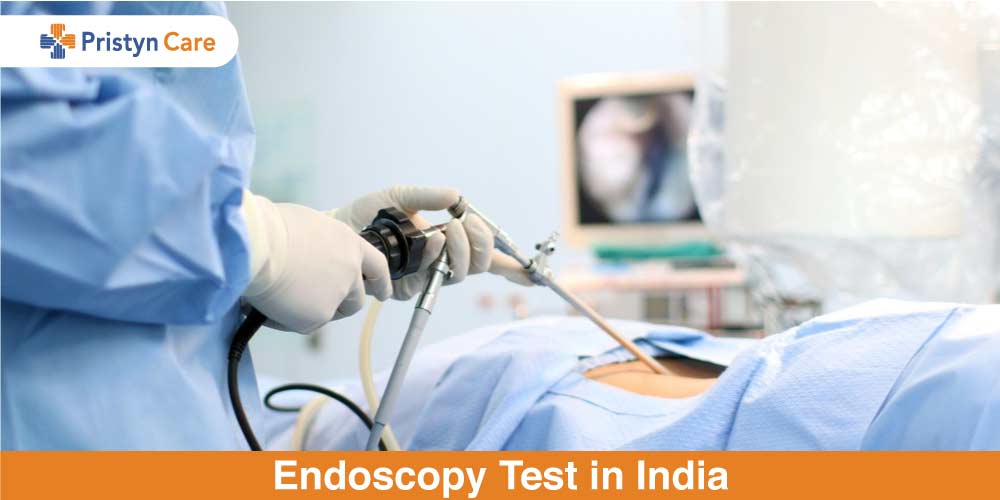
Table of Contents
What is an endoscopy test?
An endoscopy test is a non-surgical procedure that doctors perform to look inside the digestive tract. Doctors use this procedure to operate and view internal organs or vessels of the body.
In this test, the doctor uses a special device known as the endoscope. The endoscope is a long, thin, flexible tube with a tiny camera attached.
Generally, endoscopy is a day-care procedure which means that the doctor can go back home on the same day and they don’t need to stay overnight at the hospital.
What happens in an endoscopy test?
Preparing For an Endoscopy
Before an endoscopy test, the doctor advises not to eat or drink for several hours. Sometimes, to clear the bowels, doctors provide a laxative especially before a colonoscopy in which the large intestine is examined or sigmoidoscopy in which the rectum or lower part of the bowel is examined. Moreover, the doctor also suggests eating a lower-fiber diet if someone is going for a colonoscopy.
People who regularly take medicines that have blood-thinning properties such as warfarin or clopidogrel are advised to stop taking this medication before an endoscopy. However, remember to stop any medicine only after proper consultation with the doctor.
During an Endoscopy
Although endoscopy is a minimal pain procedure, it can cause extreme discomfort. In addition to the discomfort, some people experience other symptoms such as indigestion or soreness in the throat.
The procedure is performed keeping the individual awake. For some people, a local anesthetic is provided to numb the specific area of the body. Another option that the doctor offers is a sedative to help relax and make the person less aware of his/her surroundings.
Once the sensation is lost in a specific area, the doctor puts the endoscope inside the specific area. The whole procedure takes 15-45 minutes to complete depending on the reason.
After an Endoscopy
The doctor provides a sedative before an endoscopy. Hence, the patient needs to rest for around 1-2 hours after the procedure. Someone needs to assist the patient back home after the procedure. However, if the endoscopy is performed without a sedative the patient can go home immediately.
Why does a doctor recommend an endoscopy test?
The two major reasons for which doctors recommend endoscopy are-
- Check the underlying cause of unique symptoms
- Assist in certain types of surgery
Some of the common symptoms for which doctors suggest endoscopy test are-
- Difficulty in swallowing due to esophageal stricture or achalasia
- Difficulty in feeding due to neurological disorders or altered conscious levels
- Abdominal pain that doesn’t seem to cure or keeps coming back
- Suffering from diarrhea, or feeling or being sick
- Losing weight unintentionally
- Suffering from heartburn or indigestion
- Blood in the stool
- Suffering from gastric/colonic polyps
- Having obstructive jaundice
What are the types of endoscopy?
Depending on the location where the endoscopy is performed, the following types of endoscopic procedures are possible.
- Gastroscopy- When the endoscopy is used to look inside the food pipe, stomach or top part of the small intestine.
- Colonoscopy- When endoscopy is used to look inside the bowel.
- Bronchoscopy- When doctors recommend endoscopy to look into the respiratory system including the airways, especially in people who have a chronic cough or coughing up blood.
- Hysteroscopy- A hysteroscopy is a type of endoscopy test that can help gynecologists look inside the womb, especially when women are suffering from irregular periods or had a miscarriage.
- Cystoscopy- Cystoscopy is used to look inside the bladder for people suffering from urinary incontinence or blood in the urine.
- Flexible sigmoidoscopy- In order to check any problem inside the lower part of the bowel, a flexible sigmoidoscopy is recommended.
- Endoscopic ultrasound-With the help of an endoscope, images of internal organs such as the pancreas or any other tissue samples are taken.
- Wireless capsule endoscopy- In this procedure, the patient has to swallow a small capsule with a camera and light that sends pictures to a computer.
In several instances, sometimes doctors perform an endoscopy to aid in certain types of surgery including laparoscopic surgery and arthroscopy.
What is the cost of endoscopy in India?
The cost of endoscopy in India ranges from Rs.1000/- to Rs 3000/-. Fortunately, there are some health policies that can cover the cost of endoscopy procedures. In such cases, hospitalization is essential.
| City | Minimum Cost | Maximum Cost |
| Delhi NCR | Rs. 2100/- | Rs. 10,500/- |
| Mumbai | Rs. 2200/- | Rs. 11000/- |
| Hyderabad | Rs. 2000/- | Rs. 10,000/- |
| Bangalore | Rs. 2000/- | Rs. 10,000/- |
| Pune | Rs. 2000/- | Rs. 10,000/- |
| Chennai | Rs. 1900/- | Rs. 9500/- |
When do you need endoscopy recommended?
Firstly, the doctor does a physical check-up and tests such as blood tests. The doctor does an endoscopy if is still not satisfied with the tests. Such cases include:
- Vaginal bleeding
- Blood in the urine
- Stomach ulcer
- Acid reflux (GERD)
- Inflammatory bowel diseases (IBD)
- Chronic constipation
- Gallstones
- Hernia
Endoscopy is more accurate in detecting inflammation or smaller abnormalities such as ulcers or tumors. During endoscopy, the doctor can obtain small pieces of tissue or cells with a fine brush for microscopic examination.







